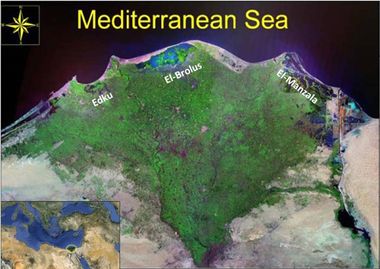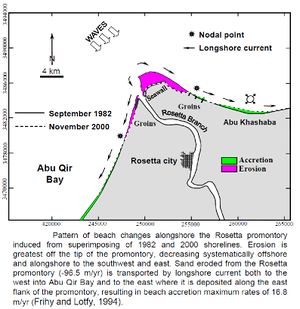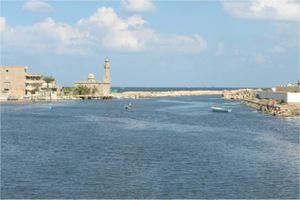Difference between revisions of "Nile Delta"
| Line 4: | Line 4: | ||
<u>'''CASE description'''</u> | <u>'''CASE description'''</u> | ||
| − | The CASE is characterised by a fluvio-marine delta, a low lying coast with lagoon and wetlands (Idku and El- Brulus), its coastal length is about 180 km. The Delta is composed of 7 main administrative units (Governorates). Almost 14 million person residents are situated at the narrow strip around the Nile River. Prevailing land/sea uses are: agriculture tourism, fisheries, industry, maritime and Oil and gas exploration. | + | The CASE is characterised by a fluvio-marine [[Wave-dominated river delta]], a low lying coast with lagoon and wetlands (Idku and El- Brulus), its coastal length is about 180 km. The Delta is composed of 7 main administrative units (Governorates). Almost 14 million person residents are situated at the narrow strip around the Nile River. Prevailing land/sea uses are: agriculture tourism, fisheries, industry, maritime and Oil and gas exploration. |
[[Image:Nile_delta_map_2.jpg|300px|thumb|right|]] | [[Image:Nile_delta_map_2.jpg|300px|thumb|right|]] | ||
Revision as of 14:19, 29 August 2016
CASE description
The CASE is characterised by a fluvio-marine Wave-dominated river delta, a low lying coast with lagoon and wetlands (Idku and El- Brulus), its coastal length is about 180 km. The Delta is composed of 7 main administrative units (Governorates). Almost 14 million person residents are situated at the narrow strip around the Nile River. Prevailing land/sea uses are: agriculture tourism, fisheries, industry, maritime and Oil and gas exploration.
ICZM phase
Main coastal issues
- Fishery
- Climate change effects such as erosion
- Land use
Objectives
- To develop adaptation strategies to climate change
- To increase fishermen well-being
- To develop planning options for decision makers
End Products
Plans-strategic vision-strategy and organisational design, with respect to:
- adaptation policy
- support of local communities in designing-implementing local development plans with particular reference to fishery and mariculture.
Tools foreseen to be developed and used
Indicators - LEAC - Scenarios - Participatory methods
Training needs
LEAC - Scenarios - Participatory methods
CASE Responsible
Susan Kholeif - National Institute of Oceanography and Fisheries - Suzan_Kholeif@yahoo.com
Elaboration: Stefano Soriani, Fabrizia Buono, Monica Camuffo, Marco Tonino, University Ca’ Foscari of Venice.


